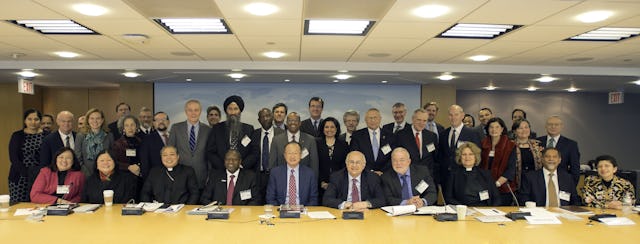Religious leaders and World Bank commit to ending extreme poverty
WASHINGTON, United States — A group of diverse religious leaders has issued a statement giving strong support and "moral consensus" to a World Bank-initiated effort to end extreme poverty in 15 years.
The statement, "Ending Extreme Poverty: A Moral and Spiritual Imperative", was released today at a media teleconference featuring World Bank President Jim Young Kim and representatives of the religious groups which drafted it, including Bani Dugal, the Principal Representative of the Baha'i International Community to the United Nations.
"Ending extreme poverty will require a comprehensive approach that tackles its root causes – including preventable illness, a lack of access to quality education, joblessness, corruption, violent conflicts, and discrimination against women, ethnic minorities and other groups," said the statement, whose authors included representatives of the Baha'i, Buddhist, Christian, Hindu, Jewish, Muslim, and Sikh faiths.
"It will also call for a change in the habits that cause poverty – greed and hedonism, numbness to the pain of others, exploitation of people and the natural world," said the statement.
Ms. Dugal said Baha'is were happy to participate in the initiative and to endorse the statement.
"In general, faith has the capacity to tap the deepest reservoirs of human motivation and therefore release the collective will and raise the consciousness of the people, in a way that brings the moral dimension of poverty to the fore," said Ms. Dugal.
"In the Baha'i view, individuals have a responsibility to assist the poor, but societies and their institutions are responsible for creating the conditions where poverty can be eradicated.
"Efforts to fulfil that responsibility and to promote the well-being of all have been blocked largely by the pursuit of self-interest and overall disunity that sadly seems to characterize many of our individual and institutional pursuits today.
"What is needed is a new vision of society where cooperation is the dominant mode of social and economic interaction, and where recognition of our underlying oneness and interdependence is firmly upheld," said Ms. Dugal.
The statement emerged from a February 2015 meeting of religious leaders, representatives of faith-based organizations, and Bank officials, which was convened as part of an overall effort by the World Bank Group to bring an end to extreme poverty worldwide by 2030.
In his invitation to religious representatives, Dr. Kim explained that "the most sensible and smart plan" for ending extreme poverty "will likely fall short unless we can also capture the moral imagination of people."
More than 30 religious leaders and representatives of faith-based organizations who participated in the process which led to the "Moral Imperative" statement have pledged to support efforts to end extreme poverty through their programs and work, if not already so engaged.
Ms. Dugal said Baha'i communities around the world seek to contribute to the eradication of poverty mainly through efforts at the grassroots level to build capacity through education and other processes, with the goal of enabling individuals everywhere to become protagonists of their own progress and development.
"These efforts, which Baha'i communities around the world are currently engaged in, also encourage individuals to consider their social responsibilities towards others," said Ms. Dugal. "At the national and international levels, we also seek to participate in discourses that emphasize the moral and spiritual dimension of development and social progress."
In addition to Ms. Dugal, today's media teleconference included the Reverend David Beckmann, President of Bread for the World; the Reverend Nicta Lubaale, General Secretary of the Organization of African Instituted Churches; Ms. Ruth Messinger, President of American Jewish World Service; Dr. Sayyid Syeed, National Director of the Islamic Society of North America; and the Reverend Jim Wallis, President of the Sojourners.
